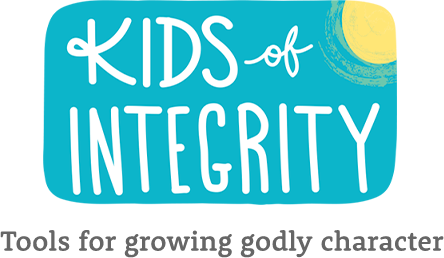Honesty

Bible stories
Select a few of the following stories to help impress on your kids just how much God hates dishonesty. If the Scripture readings are too complex for your children to understand, you may wish to use the summary provided under “key concepts.”
The story of Achan
Read Joshua 7, and Psalm 86:5-6, 11.
Questions for discussion
- Have you ever taken something that didn’t belong to you?
- How did you feel?
- Did you give it back?
- What did Achan do?
- What happened to Achan?
- Even if you think no one is watching when you take something that does not belong to you, who always sees you?
Key concepts
When the Israelites conquered Jericho, Achan disobeyed God by keeping some of the gold and silver from Jericho for himself. Achan hid what he had stolen and tried to cover up his sin.
God dealt with Achan severely because God hates dishonesty! But as much as God hates lying and stealing, He will forgive you when you are truly sorry about what you have done. Mom and Dad will also forgive you when you repent of wrongdoing.
Ananias and Sapphira tell a big lie
Read Acts 5:1-11.
Questions for discussion
- What did Ananias and Sapphira do?
- What happened to Ananias?
- What happened to Sapphira?
- Certainly lying to God is a dangerous thing to do. Do you think that lying to anyone is a good thing to do?
- Do you think God only cares about big lies or do you think He cares about little lies, too?
- What would you think if you saw one of your friends die because they had lied to God?
- What happened to the other people in the story after Ananias and Sapphira died?
Key concepts
Ananias and Sapphira tried to deceive God by lying. They said they had given God’s people all the money they received for selling a field, when in fact they had kept some of the money for themselves. But God knows everything and sees everything so it is impossible to trick Him. God put Ananias and Sapphira to death for lying. When the people saw it, they began to understand how much they should respect God and be truthful. God does not like it when we lie to Him or to anyone else.
Like father, like son
Read John 8:44-47, Psalm 33:4 and Titus 1:1-2.
Questions for discussion
- Who is your father?
- How are you like him?
- How would you like to be like him when you get older?
- Would you rather have an honest or a dishonest father?
- What does the Bible say about God and truth?
- Can we say the same thing about you as we can say about your Heavenly Father?
Key concepts
Satan is called the “father of lies.” You cannot trust or believe anything that Satan says or does. God only speaks what is right and true and it is impossible for Him to lie (Hebrews 6:18). God can be trusted. Honest people can be trusted. Dishonest people cannot be trusted. Even though your father is an honest person, you must decide for yourself whether or not you will be trustworthy. There will be many times in your life where you will have to choose to be like your Heavenly Father who speaks only truth, or choose to honour Satan by lying.
Abraham hides the truth
Read Genesis 20:1-28.
Questions for discussion
- Have you ever told most of the truth, but missed part of the truth?
- Why did Abraham lie?
- What did God do?
- Is it ever OK to lie, even to protect yourself?
- Instead of lying to protect himself, what should Abraham have done?
Key concepts
When Abraham moved to Gerar, he told the people that his wife Sarah was his sister. This was only half of the truth. (She was, in fact, his half-sister – they had both had the same father.) Abraham did not tell the whole truth because he was afraid that if the people knew that Sarah was his wife, someone would kill him so they could have his beautiful wife. He decided to tell them that Sarah was his sister so they would treat him well.
The king wanted Sarah for himself, but God warned him in a dream that Sarah was already married, so the king gave Sarah back to Abraham, along with many gifts. God chose to protect Abraham, even though he didn’t tell the whole truth. Abraham should have trusted that God would protect him, even if he did tell the truth about Sarah being his wife.
God cares for the righteous
Read Psalm 52:1-7.
Prior to reading the psalm, explain the history behind it to your children. David was running away from King Saul because he was afraid that Saul was going to kill him. Saul had turned away from following God. God had chosen David to take Saul’s place and this angered Saul. While David was hiding from Saul, he wrote this psalm.
Questions for discussion
- Has anyone ever made you scared when they chased you?
- Would you have been scared if you were David?
- Why was David confident that the Lord would protect him?
- Has anyone ever told a lie that got you into trouble?
Key concepts
David was confident that God would care for him because he was righteous. He believed that God would destroy the evil people who were chasing him and who loved falsehood (lies) instead of truth.
It is easy to be afraid of people who lie or do other bad things. When you are tempted to be afraid of those who do wrong, remember this psalm of David and be confident, as David was, that God will care for you.
God destroys dishonest people
Read Jeremiah 5:1-3, 12-17.
Note: The content in this story may be frightening for a young child.
Questions for discussion
- What does God look for?
- What makes God angry?
- What did Jeremiah tell the people God would do to punish them for their dishonesty?
Key concepts
God was looking for honest people in the city of Jerusalem, but there weren’t any – not even one. So God decided to bring their enemies against them to destroy their city, their crops, their flocks and herds, and even their families. God doesn’t like lying at all!
Micaiah prophesies the truth
Read 1 Kings 22: 1-23, 29-37.
Note: This is a long story that contains references to blood and death. You may want to read it ahead of time and paraphrase it for your children, or use the summary in the “key concepts” below.
Questions for discussion
- What did most of the prophets tell the king of Israel (King Ahab)?
- What did Micaiah tell King Ahab?
- Why didn’t Ahab like Micaiah?
- What happened to Micaiah when he told the truth?
- What happened to king Ahab in the battle?
- Who told the truth?
Key concepts
The king of Israel (Ahab) and the king of Judah (Jehosophat) were considering going to war together. Jehosophat agreed to go if they first asked for God’s direction. Ahab brought together many prophets and asked them if he should go to war. (A prophet is someone who speaks the word of God, as directed by His Holy Spirit).
Unfortunately, none of the prophets that Ahab asked were honest prophets. These dishonest prophets spoke their own words instead of God’s words and told the kings they should go to war because the Lord would help them win the battle.
Jehosophat recognized that these men were not true prophets and asked if there was a prophet of the Lord they could ask. Ahab said there was a prophet named Micaiah, but Ahab didn’t like to listen to him because Micaiah never prophesied anything good about Ahab. Finally, Ahab did ask Micaiah if he should go to war.
Micaiah said, “Go, you will be victorious.” Then Ahab said, “I really want to hear the truth.” Then Micaiah told him the truth – that Israel would be like a flock of scattered sheep without a shepherd if they went to war. Micaiah also prophesied that a spirit would entice Ahab into battle by putting a lying spirit into the mouths of the prophets.
Ahab did go into battle. He disguised himself as a regular soldier, but he was still killed in the battle, just as Micaiah had prophesied.
Remember that people will not always like it when you tell the truth, especially if you say things they don’t want to hear. But it is important to speak the truth, no matter what others want you to say. Micaiah was even put into prison for speaking the truth. God is pleased when we speak the truth.
A false prophet tells lies
Read Jeremiah 28.
Questions for discussion
- What lie did Hananiah tell?
- What did Jeremiah say about truth?
- What did Jeremiah prophesy?
- What happened?
- Who knows if someone is telling the truth?
Key concepts
The prophet Hananiah told the Israelites some good news, but unfortunately it wasn’t true. He said God had told him that within two years’ time, some of their people who had been captured and taken as slaves to Babylon would be released from captivity and allowed to go back to Jerusalem. But God knows who is speaking the truth and who is lying. God showed Jeremiah that Hananiah was telling lies, and He punished Hananiah severely. In Proverbs 19:5, God’s Word says, “A false witness will not go unpunished, and he who pours out lies will not go free.”
Lies are never worth it
Read 2 Kings 5:19-27.
Note: To understand the preceding events, review 2 Kings 5:1-16. Explain to your children that after God healed Naaman of his leprosy, Naaman offered Elisha a gift of thanks. Elisha would not take the gifts, but his servant Gehazi had a different idea.
Questions for discussion
- Why did Gehazi go back and see Naaman?
- What did he tell Naaman?
- Was this true?
- What did Elisha ask Gehazi?
- What did Gehazi tell him?
- What was the punishment that God provided for Gehazi?
- Is it ever worth telling a lie to gain something?
Key concepts
God used Elisha to help heal Naaman of his leprosy. After he was healed, Naaman was so thankful, he offered Elisha a gift, but Elisha refused to take it. Later, Elisha’s servant, who was named Gehazi, ran after Naaman and pretended that Elisha had changed his mind and did want a gift after all. Naaman happily gave Gehazi silver and clothing. But God showed Elisha everything that had happened, and how Gehazi had lied. The punishment for his deceitfulness was the dreadful disease leprosy – the very thing Naaman had been healed of. Gehazi not only lost the trust of his master, but he also lost his health.
Before we tell lies to get something we want, we must remember that lying will not please God or our parents. It is not worth gaining any material possessions if it means we lose the trust of others and cause God to be disappointed with us.
- Acceptance
- Adaptability
- Attentiveness
- Christmas
- Compassion
- Confidence
- Consideration
- Contentedness
- Cooperation
- Courage
- Courtesy
- Discernment
- Easter
- Faithfulness
- Forgiveness
- Generosity
- Gentleness
- Gratitude
- Harmony
- Honesty
- Humility
- Joy
- Kindness
- Obedience
- Patience
- Perseverance
- Respect
- Responsibility
- Reverence
- Righteousness
- Self-control
- Thanksgiving

